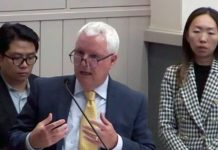
Outgoing South Pasadena City Manager Sean Joyce on Thursday put the kibosh on public demands that the City Council place on its agenda a public discussion about the results of investigations the city commissioned concerning dozens of complaints filed against city police officers in connection with incidents that took place last year involving Black Live Matter protests and a Trump rally.
The demand for such a Council discussion was repeated by over a half dozen persons who made public comments at Wednesday’s City Council meeting. They complained the investigator’s finding that while city law enforcement officers need more training on how to recognize hate crimes and write reports, the department itself was found not to have engaged in biased policing. The investigations, which concluded that nine of the city’s 36 police officers and its former chief violated various polices in handling the incidents, were conducted by Garon Wyatt Investigative Services.
In an email, Joyce said that in light of the law on disclosure of police complaint reviews “and the fact that personnel actions for police or for other operational employees are confidential matters that do not fall under the purview of the City Council or other legislative body, there are no plans to place these personnel matters before the City Council.”
Newly appointed Police Chief Brian Solinsky briefly addressed the investigation at a Public Safety Commission meeting May 10 but confined his comments to the fact of the issuance of the report. Joyce noted the chief is constrained by the same statutory considerations on personnel matters.
But Ed Donnelly, a member of the Commission, told the South Pasadenan News, “now that the investigation is complete, it makes sense to have community discussion regarding South Pasadena police policy,” particularly now that there is a new chief in place.
Victoria Patterson, one of the complainants, told the Council “it seems that the City of South Pasadena would like to absolve the SPPD and itself as well. The investigation concludes that the police department is free of bias. The same investigation establishes that the department failed to utilize proper investigative techniques multiple times for determining hate bias, action, and assaults and that the subsequent police reports were shoddy and error filled. How does one not lead to the other?”
Matthew Barbato cited the investigator’s finding that nine police officers “handled their jobs poorly. To see the conclusion of that be, that there is no bias is just sort of shocking to me.”
Another city resident who said she was a civil rights attorney said she was troubled to learn that SPPD officers “had let racist attackers walk away scot free.” The investigation showed that SPPD officers “at every rank, including line officers, seasoned corporals, detectives, sergeants and the chief, failed to investigate the incidents as hate crimes in violation of their own policy. This is quintessential biased policing, where crimes against people of color by white perpetrators are dismissed without adequate investigation. It is inconceivable that a mistake of that magnitude could happen unless there was deep, systemic bias against people of color throughout the ranks.” She said it must be agendized “so we can hear from the Council what it’s next steps are going to be.”
Ellen Hushagen said the investigator “couldn’t see the forest for the trees. The incidents over the summer and fall of 2020 taken together paint a disturbing picture of bias within the ranks of the SPPD. Yet the reports and findings seek to establish that there is nothing to see here” but a need for more training. “The community deserves full transparency about what evidence the investigator considered and whether the Council intends to pursue any further action.”
Attorney Helen Tran said that so many officers including the chief “failed to investigate these incidents as hate crimes… are serious and deeply concerning findings. What it means is that hate crimes are not being investigated in our city or referred to the District Attorney’s office for prosecution,” which means that “anyone who commits a hate crime in our city will never be held accountable.” She said the issue deserves “a lot more public discussion.”
Bill Kelly said the findings mean police “did not consider a string of assaults, intimidation of peaceful BLM protesters and Democrats at the Trump rally to be hate crimes despite that air waves and headlines have been dominated by the growth of racial and political hatred in America.” He said there were numerous and repeated incidents over the past year in town “that were systematically ignored as potential hate crimes. That clearly constitutes a pattern of biased policing which has been tolerated by police management.”
Kelly said, “it is time for the City Council to provide a full accounting of what the city is doing to put an end to bias policing and not sweep it under the rug.”



















.png)









